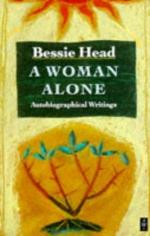
|
| Name: _________________________ | Period: ___________________ |
This test consists of 5 short answer questions, 10 short essay questions, and 1 (of 3) essay topics.
Short Answer Questions
1. What special category did Bessie see her writing in?
2. Bessie's suffering in South Africa created in her a reverence for what?
3. What people did the Bushmen resemble?
4. What does Bessie attribute her bad habits and violent nature to?
5. Who is the main character in Bessie's first novel, "When Rain Clouds Gather"?
Short Essay Questions
1. What was Bessie's first experience of racism in a black form?
2. In "African Religions," what, does Bessie state is the main difference between Asian and African religious ideals?
3. In "God and The Underdog," what does Bessie feel fuels revolutions?
4. In the conclusion of Chapter 2, how does Bessie summarize her life experiences?
5. In "Makeba Music," how does Bessie describe the musician, Makeba?
6. Why according to Bessie has Botswana survived by "sheer luck and unexpected good fortune"?
7. Why does Bessie think of the American woman as some sort of goddess?
8. In "Social and Political Pressures . . . ," what astonished Bessie about the book "One Hundred Years of Solitude"?
9. Why was it so difficult for Bessie to deal with South Africa creatively?
10. In "Notes on Novels," why is Bessie having difficulty writing about her years in South Africa?
Essay Topics
Write an essay for ONE of the following topics:
Essay Topic 1
In "An unspeakable crime", Bessie expresses her disdain of the Coloured Affairs Department. What are they doing in Port Elizabeth and Capetown that she disagrees with? Describe the actions of the coloureds, whom she feels are accessories to the crime. Are they ashamed of their actions? Should they be? Do you think that they truly don't know their own minds and think that the Coloured Affairs Department knows what's best for their children? Or, do they see the situation for what it is and go along with it because it's the only way to survive?
Essay Topic 2
While Bessie is a true supporter of the black Africans, she can also be highly critical of them. Their lack of initiative in trying to better their situation is a common frustration to Bessie. List three examples that illustrate Bessie's frustration with perceived "passivity" of other black Africans. Bessie admits that she prefers to be on the sidelines when writing. Do you think that it's fair for Bessie to judge others from the sidelines instead of getting actively involved herself?
Essay Topic 3
When Bessie spent four months in Iowa researching a book, she was surprised to discover that America was not as she had imagined. How did she compare America to the villages of early Europe? Was it easy for her to adapt to life there? Was she able to develop her "all-important" routine there? What did it consist of? What were her thoughts on the university library? What was she surprised and excited to find there? Do you think that Bessie had pre-conceived notions about America? Do you think that her stay in Iowa gave her a broader, more accurate picture of America? How do you think she would have described it and the people after her trip?
|
This section contains 960 words (approx. 4 pages at 300 words per page) |

|




